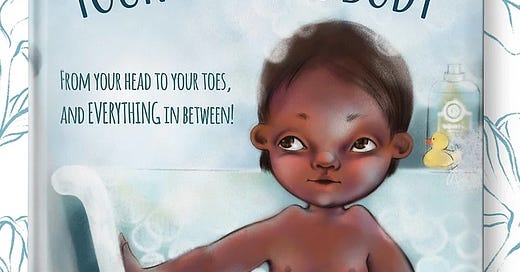Welcome ~ Let's get started ~ I have a sex ed gem to share!
You want to raise a child who knows how bodies work and who can build stable, loving relationships with themselves and others, correct?
It starts with language. Words have power. Words help shape our world.
With the risk of being radical, I believe sexual health education starts at birth. A calm tone and anatomically correct words build a sexual wellness foundation.
Teach Anatomical Names For Genitals
Why does this matter?
You may think, "I always called my private parts my 'pee pee,’ and that was fine." In my friend Christina's house, girls had a ‘chee chee’ and boys had a ‘choo choo. So what, right?
It matters. check out the comment section from this 2016 NYT article ~ it’s vulva, folks
3 Reasons to Teach Accurate Genital Names:
It helps prevent sexual abuse
It prevents shame and lessens taboo
It promotes body positivity
The intersection of children and sexuality is delicate, which is probably why we sometimes feel uncomfortable… about all of this. But body parts, are body parts, are body parts — when we simply call them by their name, everyone wins!
Here are two simple ways to teach anatomical words for genitals.
#1 - Read A Book With the Child
lean on the written word🩷
Your Whole Body, From Your Head to Your Toes and EVERYTHING In Between by Lizzie Charbonneau is the BEST book to teach genital names to children ages 0-6.
The author, my friend, Lizzie Charbonneau, was looking for a book to help her say words like penis and scrotum, out loud, to her son. When she couldn't find the kind of book she was looking for, she wrote one.
This book is gender and disability inclusive and represents diverse young children. The book was beautifully illustrated by Misha Iver and won the 2022 award from the American Association of Sexuality Educators, Counselors, and Therapists.
#2 - Use anatomical names in everyday life
Even before the child is verbal, when diapering, or whenever really - practice consent and name the body parts accurately.
Example scripts:
"Are you ready? Can Mama clean your penis now?"
or
"Daddy is about to change your diaper. It’s important to keep your vulva and anus clean. Do you want me to help you keep your body healthy and clean?"
The child's answer is energetic. They don’t typically nod or say yes, but this type of conversation models consent and uses anatomically correct language. The child is absorbing the way peoople speak and interact.
By the way, please don't think that your child doesn't know what you are saying. Your little bundle of magic is growing 80% of their brain between the ages of 0 and 3. They are sensorially and experientially learning. Life is their classroom and you are their head teacher.
In the Montessori world, this stage is called The Absorbent Mind because a child is literally absorbing everything from the environment, mapping the world and making millions of neural connections.
I once heard a radio host announce his son had spoken his first word: "octopus!" Octopus? That’s an odd first word. Well, an octopus mobile hung over the child's changing table, where they had countless diaper changes, post-bath snuggles, and sweet conversations. What might your child be absorbing?
*side note- I’m also a mother who survived the infancy stage — with twins. Let's be real; changing a child's diaper is not always pleasant, nor consensual. I get it. Sometimes we need to wrestle those little rascals into a clean diaper, swear under our breath, then calm down with a snack.
Through it all, we can still call a penis a penis and a vulva a vulva.
It may feel strange and uncomfortable, at first. But, don’t worry, it won't feel like that forever. Taking the wheel of a car for the first time can feel scary and overwhelming, but with practice, it becomes second nature. Same with saying testicles to a toddler.
With practice, our language changes and it’s no big deal. When I notice one of my children with their hands in their pants, I'll ask, using a neutral tone, "Is your penis ok?" (again, nbd)
Say it with me “penis - vulva - nipples … hurray! " “scrotum - anus - clitoris… hurray!”
When you replace euphemisms with anatomical words, you will:
Unshame sexuality
Help children learn about their bodies
Plant healthy seeds for future sexual health conversations
Look at you ~ you’re off to the races ~ educating your children, sexual wellness and all!
🩷





